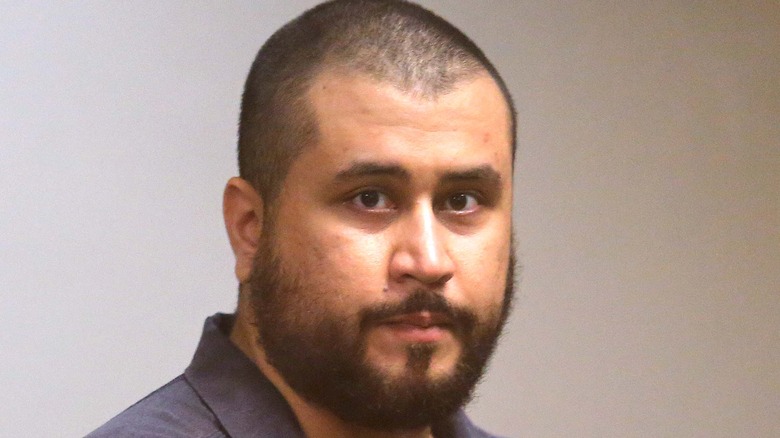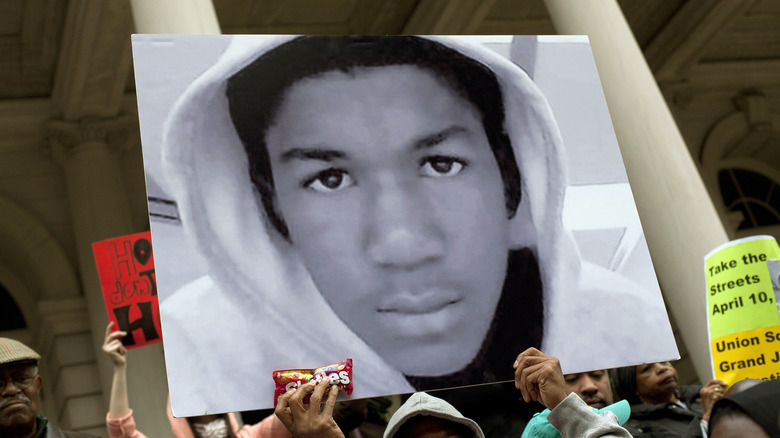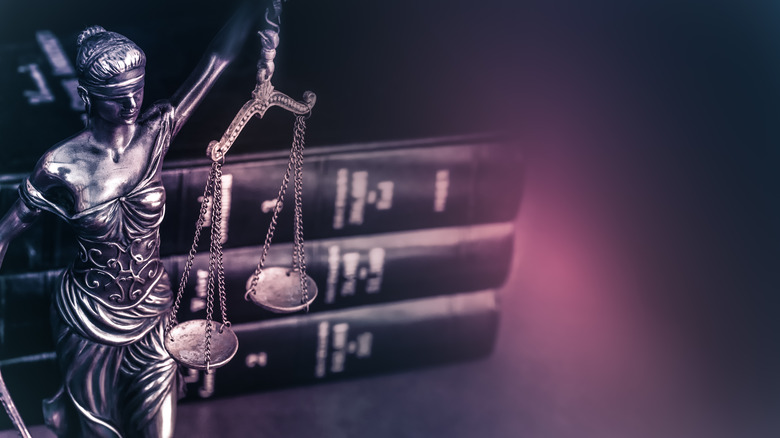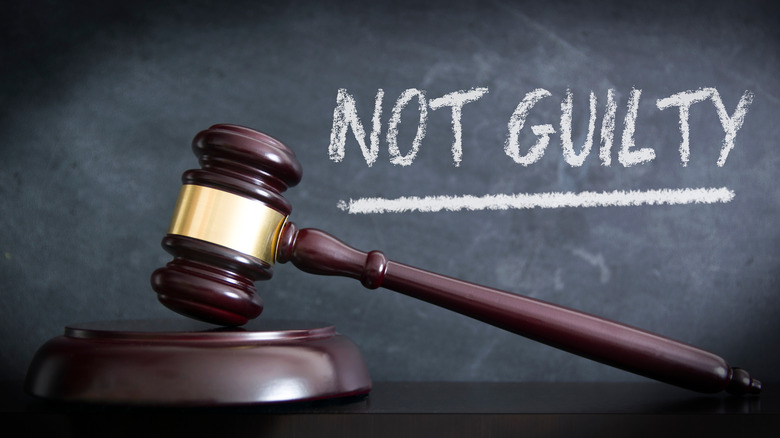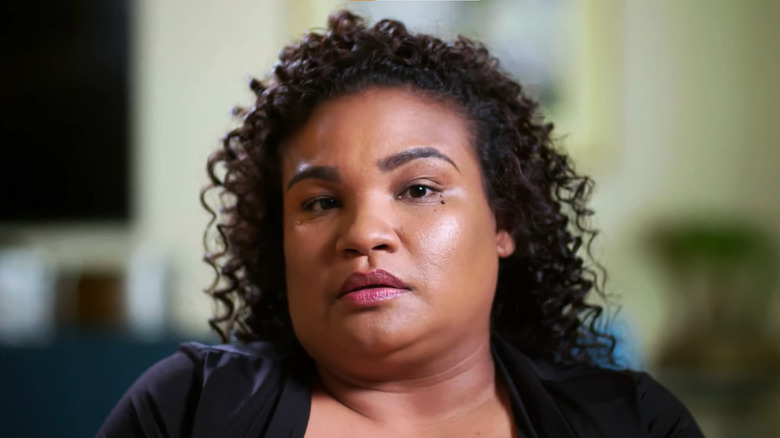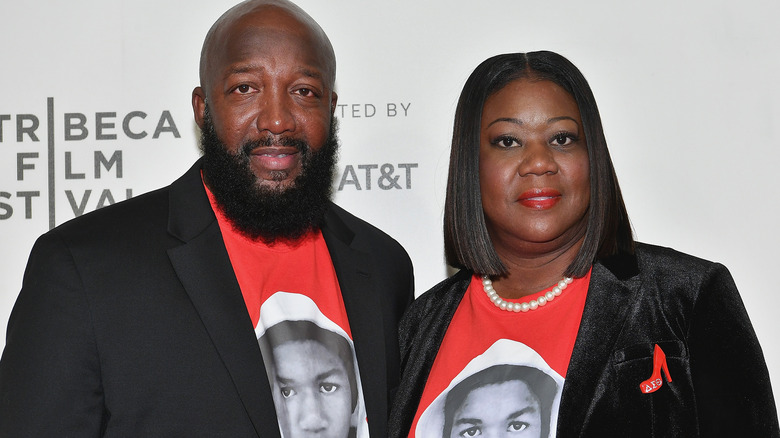What It Was Like Serving On The George Zimmerman Jury
On February 26, 2012, George Zimmerman killed Trayvon Martin, a Black teenager who was returning to a relative's home after a snack run. The then 28-year-old neighborhood watch coordinator for The Retreat at Twin Lakes gated community took his job seriously. A rash of burglaries with Black male suspects provoked Zimmerman to conclude the lone 17-year-old was "up to no good" and decide to pursue him, despite being told not to (per Reuters).
What took place remains a mystery, as only one side of the story can be told — the side of the only survivor. Zimmerman claimed Martin approached and attacked him. Their scuffle was loud enough for 911 to receive multiple calls from alarmed neighbors. By the time Sanford police arrived, Martin was dead from a single gunshot and Zimmerman was bloody and bruised.
Zimmerman admitted to killing the unarmed teenager, but said he only did so in self-defense. Law enforcement let him go without charges, despite some officers suspecting his injuries were inconsistent with his story, and the language Zimmerman said Martin used sounding contrived. Persistent public outcries for justice, an online petition, and scrutiny over police missteps led lead prosecutor Norm Wolfinger to step down, and state attorney Angela Corey took over. Corey charged Zimmerman with second-degree murder on April 11, 2012, six weeks after Zimmerman killed Martin (via the New York Times).
Jury selection was another polarizing element in Trayvon Martin case
Jury selection began June 10, 2013, with 750 potential jurors. Florida has a 10 person jury system, which only requires six to reach a verdict with four blind alternates. While attorneys on both sides knew finding people who knew nothing about the case would be tough, they also wanted to weed out stealth jurors.
The candidates were asked about their knowledge of the case and how they felt about guns, minorities, and law enforcement. There was a clear effort by the defense to scrutinize minority jury candidates. Don West, one of Zimmerman's defense lawyers said as much in Episode 3 of Oxygen's "The Jury Speaks" show. "There was a clear racial aspect to jury selection. Rightfully or wrongfully, I think we were more 'suspicious' about African American jurors because of the way the case was portrayed in the media," according to West.
After two weeks, six jurors and four alternates were selected and immediately sequestered. The lack of racial and gender diversity within the jury, which consisted of five white women and one Latina, added to the skepticism and racial bias concerns already permeating the case (per The Atlantic). For the next 22 days, jurors were cut off from the world and lived together, oblivious to news and speculation from supporters, lawyers, and the media.
Zimmerman's side is only one side to this story
George Zimmerman's trial began on June 24, 2013. The prosecution wasted no time pegging Zimmerman as a racist vigilante who determined an unarmed Black teenager was "up to no good." John Guy peppered his opening statement with profanity that Zimmerman used while talking to a 911 dispatcher. He talked about how Zimmerman racially profiled, pursued, harassed, and detained the 17-year-old who was merely walking in the rain. When he began to lose the encounter he instigated, Zimmerman shot Martin, not because he had to, but, "because he wanted to," Guy contended (via The Washington Post).
In the same Washington Post article, the defense claimed Zimmerman was performing his neighborhood watch duties when unprovoked, and that Martin attacked him. He asserted that Zimmerman was sucker punched and his head was pounded against the ground repeatedly. When Martin tried to take Zimmerman's gun, he had to defend himself, according to the defense.
The prosecution produced Rachel Jeantel, who said she was talking to Martin during this time. She testified Martin was concerned about a man who was following and chasing him. She heard a "hard-breathing man" who said "What are you doing around here?," then Martin saying "Get off. Get off." Unfortunately, the negative perception of her demeanor and a handful of untruths overshadowed her testimony and helped the defense more than the prosecution (per Los Angeles Times).
George Zimmerman acquitted in Trayvon Martin's death
On July 13, 2013, George Zimmerman was acquitted of 2nd degree murder for killing Trayvon Martin. Massive fury was aimed at the jury, and the question of how Zimmerman got away with murder when it was his noncompliance that resulted in the unarmed teen's death was at the forefront.
Several legal experts predicted the outcome, with pundits and Zimmerman supporters agreeing the jury got it right because Florida's self-defense laws wouldn't permit a 2nd degree murder conviction. Martin's supporters foresaw the outcome as well. This wasn't the first time someone senselessly murdered an unarmed Black male with no consequences. For them, the aftermath was a prime example of how little Black lives are valued (per USA Today).
Juror B29, aka Maddy Rivera, told ABC News she initially voted for second-degree murder because the evidence supported it. But after deliberating for 18 hours over two days, she felt pressured to acquit Zimmerman based on the jury instructions (per ABC News). According to The Jurist, a flawed Florida law incorporated into the jury instructions produced the outcome, not the jurors. The law states that a person can instigate a confrontation and use deadly force to defend themselves.
The Young Turks host Cenk Uygur said, "There's something wrong in a system that allows you to chase someone down with a gun, and then after you start the fight you feel you're losing anyway, that you are allowed to kill him and we have to take your word for it."
Exhausted jurors were dismayed they were blamed for Zimmerman's acquittal
The acquittal weighed heavily on the mentally exhausted jurors and they had no idea the trial had taken on a life of its own until they returned home. The anger and negativity thrown their way overshadowed the joy of reuniting with their families and returning to their lives. People were mistakenly holding them responsible for the results of a decision they were obligated to make.
Within 48 hours of the verdict, Juror B37 secured a literary agent and an interview with Anderson Cooper. Remarks like, "I think George Zimmerman is a man whose heart was in the right place," during her cloaked appearance, compelled Jurors B51, B76, E6, and E40 to distance themselves from her in a statement released through the Florida Eighteenth Judicial Circuit Court (per ABC News). Genie Lauren felt the acquittal was a miscarriage of justice, and Juror B37's attempts to capitalize on Martin's death incensed her. She successfully petitioned to have the book project revoked by circulating a Change.org petition aimed at the literary agent Sharlene Martin on Twitter (per ABC News).
Rivera, who identifies as a Black Hispanic, felt as if she let her community down and went into a deep depression after the trial. She felt the law required her to acquit someone she felt was guilty, and she "mourned the loss of a son that wasn't hers." She went on an apology tour of sorts, granting interviews explaining Zimmerman's acquittal and how it impacted her life (per Inside Edition).
Martin's parents continue Trayvon's legacy while Zimmerman courts controversy
Except for their The Jury Speaks appearances, the jurors have been absent from the media and seem to have gained a sense of normalcy. Sybrina Fulton increased her political and social involvement after Trayvon's death. She ran for a seat on the Miami-Dade County Board of County Commissioners, but lost to Mayor Oliver Gilbert by 331 votes. Tracy Martin and Fulton coauthored "Rest in Power: The Enduring Life of Trayvon Martin" in 2017, and run the Trayvon Martin Foundation together (per The Guardian). Tracy and Sybrina's book inspired the docuseries from Jay Z and the Weinstein Group, "Rest in Power: The Trayvon Martin Story," in 2018.
Less than two months after her husband's acquittal, Shellie Zimmerman filed for divorce and expressed doubts about what really happened that fateful night. The combination of life on the run; his absence during her perjury trial, though she supported him during his; and a domestic violence incident; helped her "take the blinders off and start to see things differently" (via Today Show).
George Zimmerman continues to be a controversial figure, according to Newsweek. One of his lawsuits accuses Trayvon Martin's parents, Benjamin Crump, and others associated with the trial of defamation and conspiracy, and seeks $100 million in damages. There have been numerous gun related arrests; the gun that killed Martin was sold for $250,000; and Zimmerman attempted to box rapper DMX. Ironically, Matthew Apperson is serving 20 years in prison for shooting at, and missing, Zimmerman in 2016 (via Fox News).
